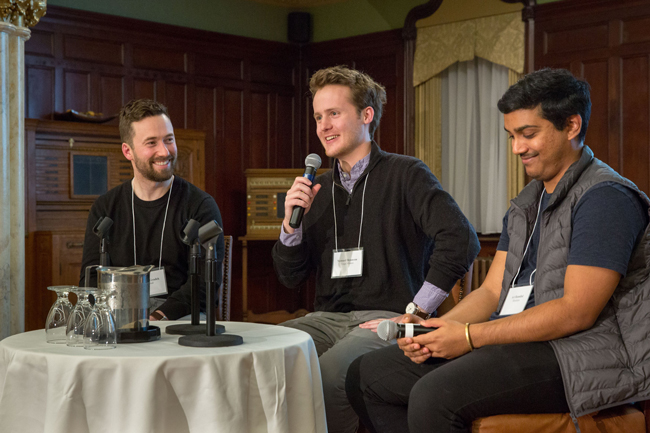
Engineering alumni share the lessons learned from their start-up experiences with students at entrepreneurship seminar
By Junji Nishihata
The lure of being your own boss is proving to be a strong draw for a lot of people these days. In fact, in the last year alone, 138,000 new start-ups were launched in the world – every day. That’s 50 million new companies opening their doors for business. In Canada the figure is roughly 100,000 new start-ups annually. For many people the question remains: what is it really like to be an entrepreneur?
For the nearly 100 attendees at the 5th annual John D. Thompson Entrepreneurial Development Seminar on Jan. 23 (despite horrible weather), it was a chance to ask this and other questions to three Faculty of Engineering alumni who have taken the plunge and launched their own start-ups. Michael Gradek (Busbud), Ari Ramdial (Rhodium Labs) and Samuel Bruneau (Taiga Motors) each spoke about their journeys to technological entrepreneurship, and what they have learned thus far.
Bruneau, the youngest and perhaps the most adventure-seeking of the three, started things off by explaining his company’s quest to build the world’s first production electric snowmobile. His team made a decision early on to develop their product entirely from scratch – the most difficult and risky way to do it, but also the most thorough. “The only way to achieve the full package was to do all the engineering ourselves,” he summarized.
It was clear through Bruneau’s presentation that a pure passion for the outdoors and adventure were major drivers for the business, along with a clearly defined set of specification objectives that they want their prototype to obtain. He also underlined the importance of working with potential customers and speaking directly to the user community for feedback, something his team did during testing in British Columbia.
Next, Ramdial delivered a more theoretical approach to entrepreneurship. Due to ongoing business discussions, he could not delve into details on his latest stealth-mode startup, so instead, he explained his internal thought processes that have led to his successful ventures.
Essentially, Ramdial’s life approach is to consider every action through a binary system whereby he asks himself: “Do I need to do this now?”
This is followed by, “Am I the one to do this?” Based on this simple but ingenuous decision tree, Ramdial has been able to build a consultancy, Rhodium Labs, that serves health, insurance and military clients.
Ramdial did stress however, that the entrepreneur’s life is no walk in the woods. “You do not have any freedom,” he explained. “Your life is governed by your team, your customers, the market. There are so many things you have to deal with.”
Finally, Gradek described how his early work at Microsoft helped pave the way for his eventual leap into the start-up realm. He learned over time that one of the keys to business success is communication, and that many people would benefit from paying close attention to their writing. Now the CTO (and co-founder) of an online bus travel company that is looking to hire as many as 50 people over the next year (from a current staff of 30+) and just closed an $11M series B round of funding. More than ever, Gradek appreciates the importance of making things crystal clear to all stakeholders in his company.
“The amount of time spent in companies trying to figure out what other people said, in whatever channel, is just wasted time,” he said, as he urged participants to spend time developing their soft skills, including communications, but also networking and team building.
After their presentations, the three entrepreneurs sat down for a panel Q&A, which was presided over by Katya Marc, the evening’s MC and manager of the McGill EngInE, the hub for technology-based innovation house in the Faculty of Engineering. There was a high degree of interest from the audience, whose questions ranged from how to raise start-up funding, to how to entice entrepreneurially-minded workers to work for smaller firms like theirs.
It was an eye-opening and informative evening, and the complementarity of the presenters’ backgrounds and businesses made for an experience that was sure to benefit those in audience looking to make the leap into the start-up life.
Watch the complete seminar by clicking on the thumbnail below
